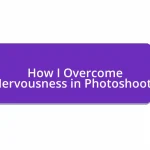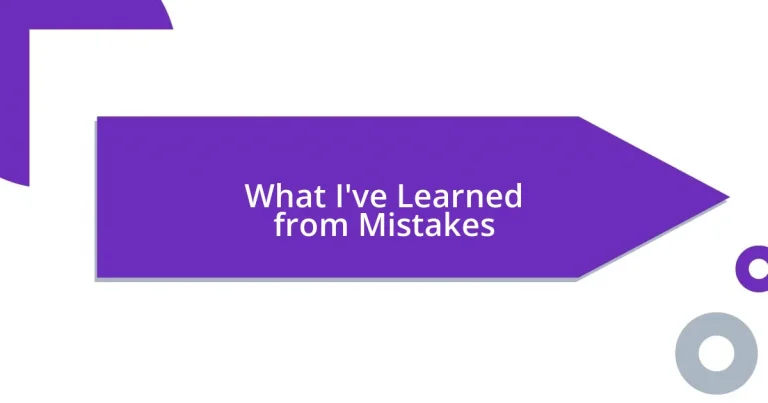Key takeaways:
- Mistakes are growth opportunities that can reveal weaknesses and lead to meaningful transformations.
- Common mistakes include underestimating relationships, neglecting feedback, and procrastination, which can all hinder progress.
- Developing a growth mindset involves embracing challenges, learning from failures, and cultivating resilience through adversity.
- Implementing structured plans, accountability, and self-compassion can help effectively overcome mistakes and foster personal growth.
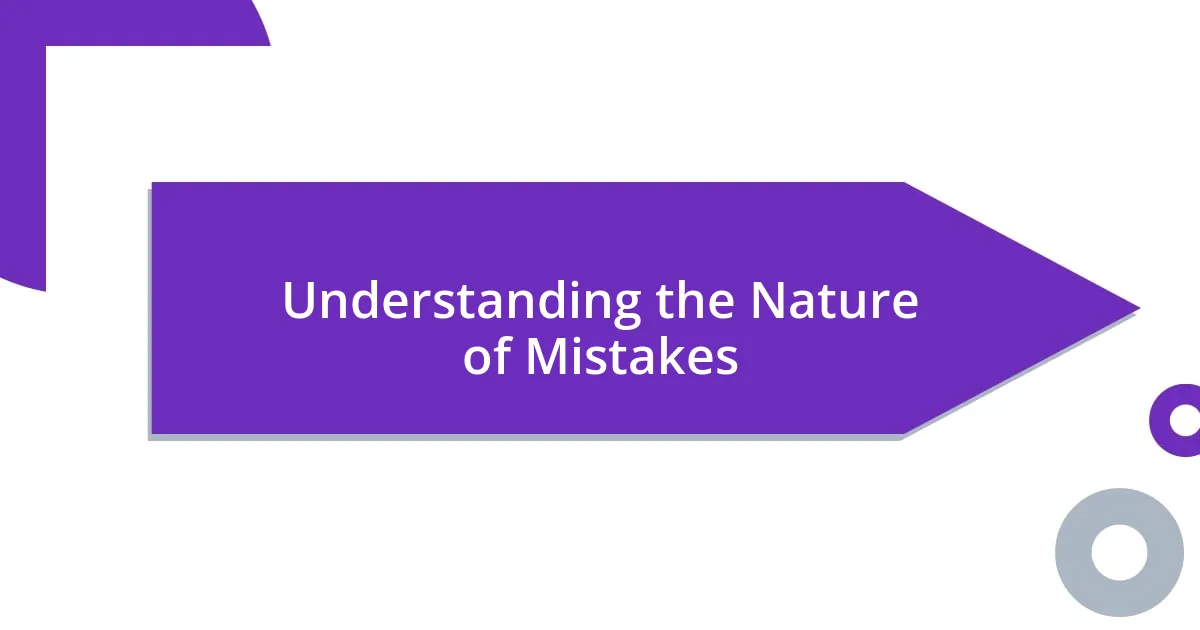
Understanding the Nature of Mistakes
Mistakes are often seen as setbacks, but I believe they hold tremendous potential for growth. I remember a time when I missed a crucial deadline for a project. Initially, I felt embarrassment and frustration, but later, I recognized that this mistake taught me the importance of time management. Have you ever experienced a moment like this, where a slip-up turned into a valuable lesson?
When I reflect on my past, I realize that mistakes can also reveal our weaknesses, making us more aware of areas that need improvement. For instance, there was a period in my career when I struggled with public speaking. Failing several times in front of an audience initially crushed my confidence; however, those experiences sparked a deep desire in me to improve. Isn’t it fascinating how discomfort can often lead to our most meaningful transformations?
Understanding the nature of mistakes requires a shift in perspective. They aren’t just failures; they’re opportunities to reassess our strategies and knowledge. I vividly recall a moment when a seemingly small mistake during a team meeting led to a brainstorming session that ultimately generated an idea that changed our approach entirely. Doesn’t it make you wonder how often our blunders have the potential to pave the way for success?
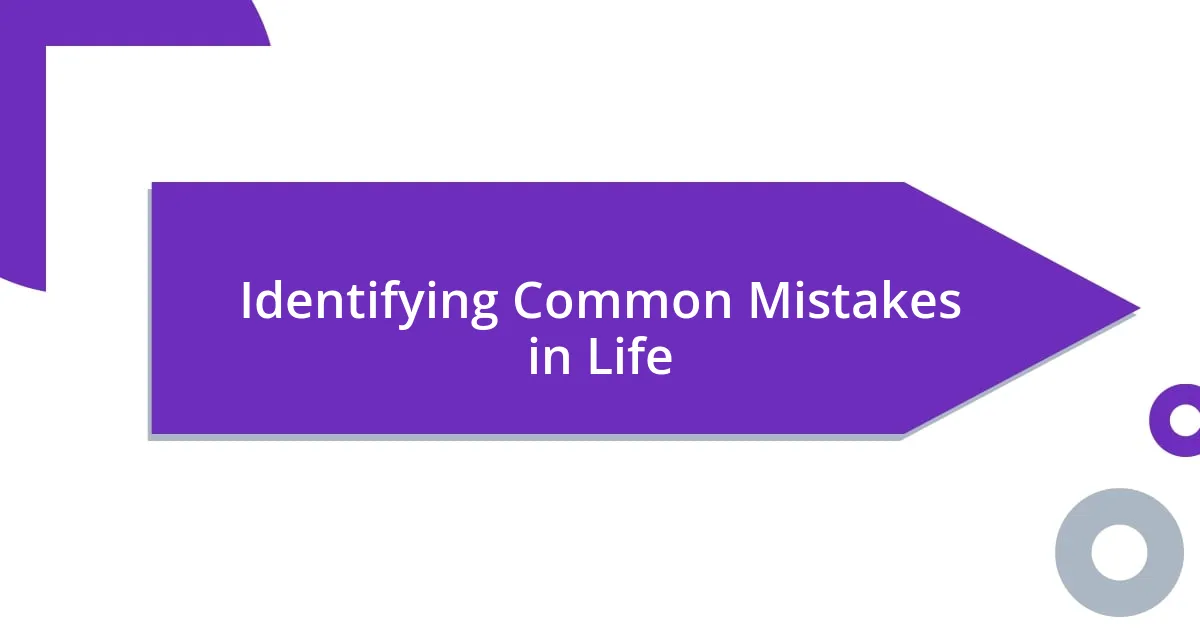
Identifying Common Mistakes in Life
Identifying common mistakes in life requires mindfulness and self-awareness. I’ve noticed that many of us tend to overlook the small decisions that accumulate into larger missteps. For instance, during my early career, I often assumed that my hard work alone would be enough to get noticed. It wasn’t until I saw a colleague approaching their goals with strategic networking that I realized the importance of building relationships, something I had initially underestimated.
Another mistake we frequently make is not seeking feedback. I remember a time when my team launched a project I was passionate about, yet I didn’t bother to ask for input from others. The result? A missed opportunity for improvement that left me feeling regretful. Engaging peers early on can provide valuable insights that enhance our work and help us avoid pitfalls. Have you ever found yourself in a similar situation, where just a bit of external perspective could have shifted everything for the better?
Moreover, procrastination is a common trap many of us fall into. I’ve experienced those moments of putting off a task, convincing myself I work better under pressure. However, I learned the hard way that this mindset led to unnecessary stress and subpar results. It’s like a cycle; the more we procrastinate, the more mistakes tend to compound, leaving us overwhelmed. Recognizing and breaking this cycle can be a game changer.
| Common Mistakes | Personal Insights |
|---|---|
| Underestimating Relationships | I’ve realized that networking is essential for career growth. |
| Lack of Feedback | Seeking external perspectives often leads to better outcomes. |
| Procrastination | Delaying tasks introduces unnecessary stress and lowers quality. |
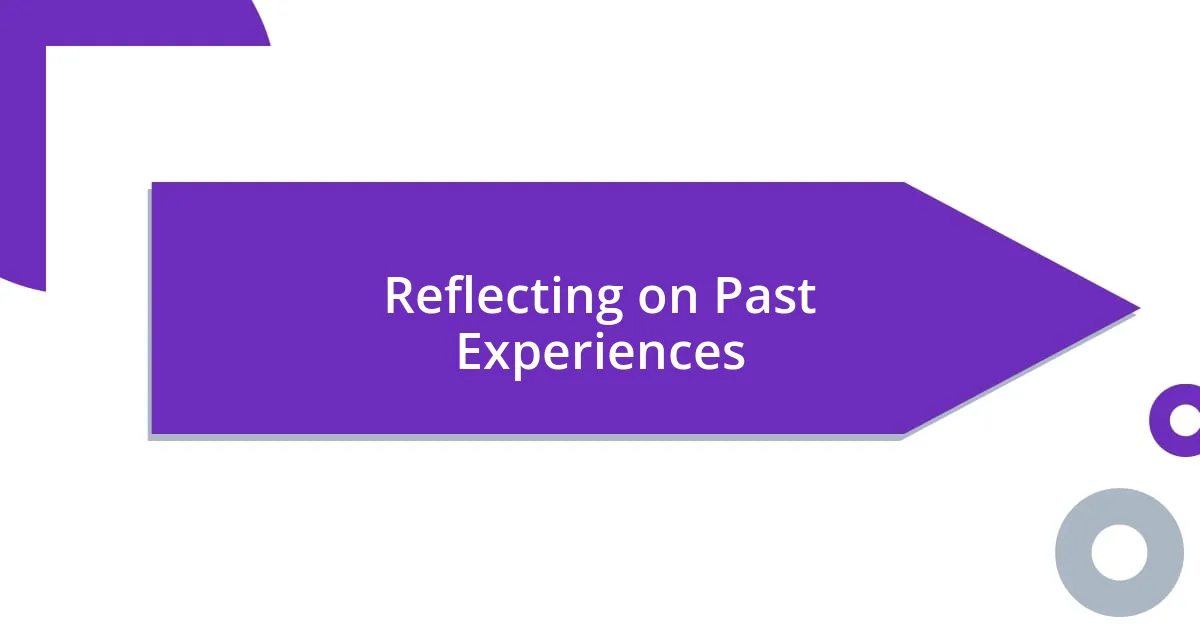
Reflecting on Past Experiences
Reflecting on past experiences has always been a powerful tool for personal growth. I recall a time early in my career when I took on too many responsibilities. At first, I thought being busy equated to being productive. It didn’t take long for the ensuing chaos to teach me that spreading myself too thin only led to mistakes and missed opportunities. In hindsight, I realize that this situation opened my eyes to the importance of strategic delegation and setting boundaries.
- Juggling too many tasks can lead to burnout.
- Embracing simplicity often reveals clearer pathways to success.
- Learning to say no is just as crucial as knowing when to accept challenges.
By diving deep into my missteps, I unearthed insights about my working style and limitations. I vividly remember a project where my team and I faced a significant setback due to poor planning. The initial disappointment lingered, but once I began analyzing what went wrong, I discovered neglected details that could have made a difference. This experience instilled in me a mindset of continuous improvement—a belief that every setback holds clues guiding us toward better outcomes. Consider your own experiences: how often have your misfortunes ushered in necessary changes?
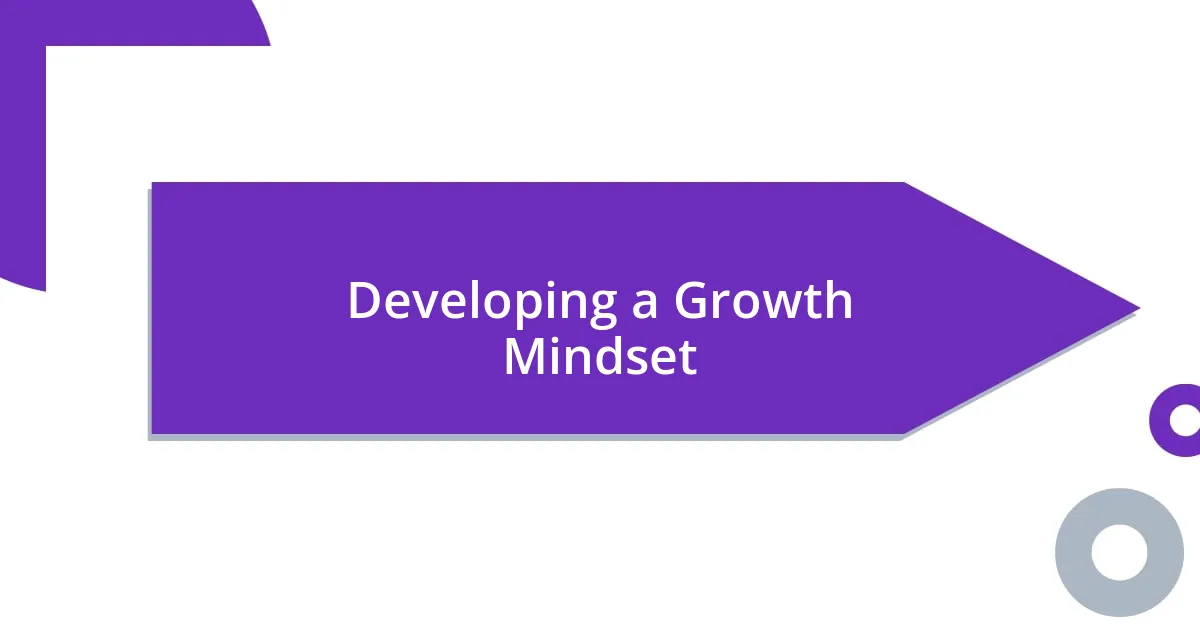
Developing a Growth Mindset
Developing a growth mindset is fundamentally about embracing challenges and viewing failures as opportunities. I remember when I struggled with public speaking. Initially, the thought of addressing a crowd sent waves of anxiety through me. However, instead of shying away, I sought out classes and opportunities to practice. Each stumble taught me valuable lessons, transforming my fear into confidence and curiosity. Have you ever faced a daunting task that prompted you to grow?
Mistakes can feel overwhelming, but they often shine a light on our capabilities. I had a project where I misjudged the time required, leading to a last-minute rush. The experience, though stressful, forced me to rethink my planning strategies. I began to appreciate the importance of timelines and realistic goals, which ultimately improved my workflow. It’s fascinating how a single miscalculation can pave the way for significant growth.
Embracing a growth mindset also means cultivating resilience. There was a time when my initial idea for a personal project fell flat, and I felt disheartened. Rather than giving up, I analyzed the feedback I received and made adjustments. This not only led to a successful re-launch but also instilled in me a deeper understanding that resilience is a skill—one that can be developed through perseverance. How have your setbacks turned into stepping stones along your journey?
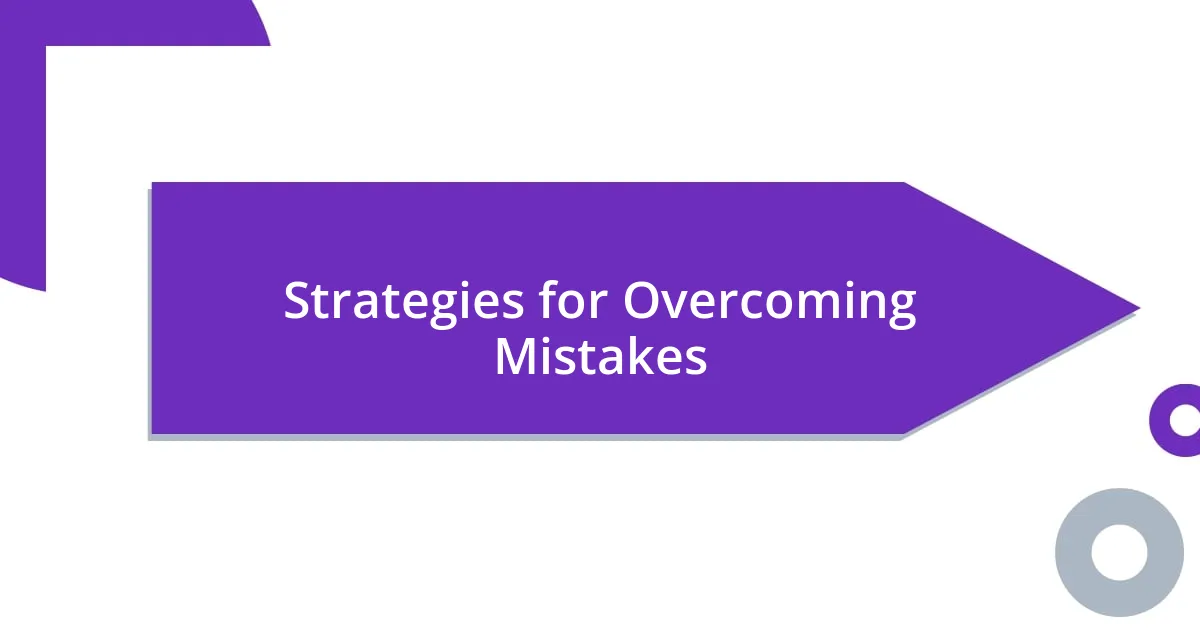
Strategies for Overcoming Mistakes
When it comes to overcoming mistakes, one effective strategy I’ve found is to create a structured plan for recovery. I recall a moment in my career where I missed a critical deadline. Instead of wallowing in self-pity, I sat down and crafted a checklist, breaking down the tasks into manageable steps. It was a game-changer! By giving myself clear direction and timelines, I transformed what felt like a setback into an opportunity for organization and improvement.
Accountability also plays a crucial role in overcoming mistakes. I once made a decision that impacted my team negatively. Rather than deflecting blame, I took ownership and openly discussed it with my colleagues. That conversation not only fostered trust but also provided me perspective on how collective problem-solving can serve as a foundation for growth. Have you ever held yourself accountable in a situation? I promise it strengthens connections and can turn an error into a shared learning experience.
Lastly, adopting a habit of self-compassion can shift your mindset dramatically. I’ve learned to treat myself with kindness when I err, recognizing that mistakes are an inherent part of the learning process. One instance I remember well is when I mishandled client communication, which caused confusion and frustration. Instead of berating myself, I took a moment to reflect and even laugh about the situation. The key takeaway was learning to approach my mistakes with curiosity instead of judgment, and this has made all the difference. How do you respond to your own errors? Embracing self-compassion can truly redefine your path toward growth.
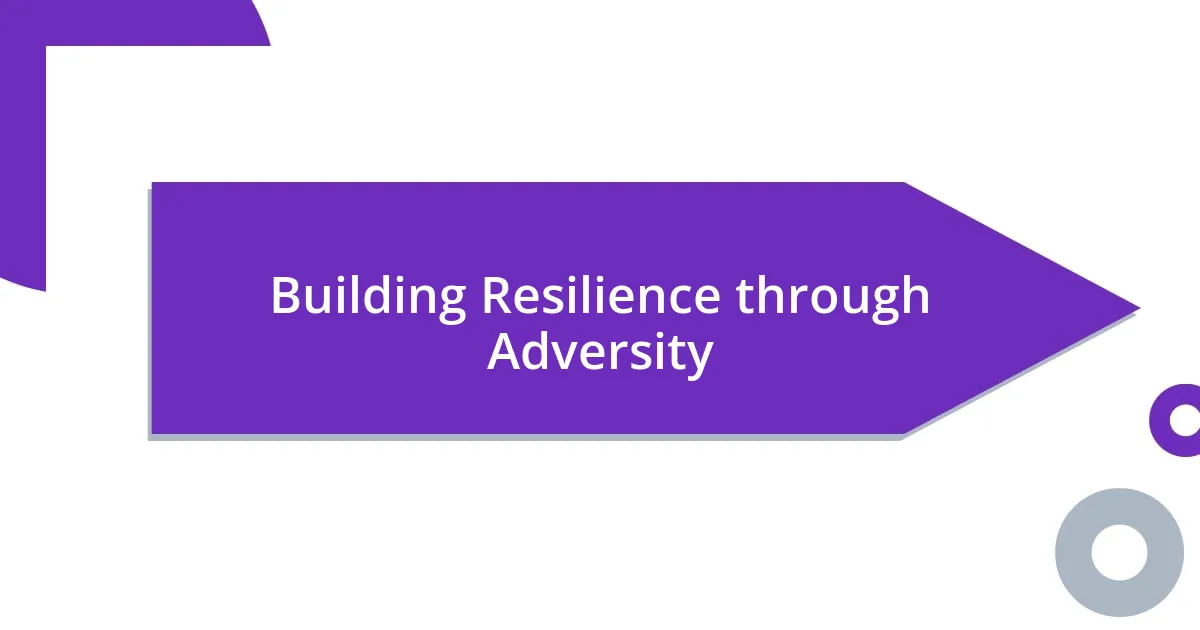
Building Resilience through Adversity
Adversity has a way of testing our limits, doesn’t it? I remember a particularly challenging time in my life when I faced unexpected financial setbacks. It felt like the ground had shifted beneath my feet, shaking my sense of security. However, this adversity pushed me to reassess my spending habits and find creative ways to save. Instead of spiraling into despair, I formulated a budget that not only helped me stabilize my finances but also built resilience that I lean on even today.
I think it’s fascinating how our lowest moments can lead us to discover our inner strength. For me, a job loss during a recession forced me to confront my fears and reassess my career goals. At first, I was lost, feeling like a ship adrift at sea. Yet that period of uncertainty became a powerful teacher. I networked more than I ever had before, met amazing people who offered new perspectives, and discovered paths I never knew existed. It was like navigating through a storm that ultimately led to clearer skies.
Building resilience is an ongoing journey rather than a destination. After facing numerous setbacks, including a failed project launch, I learned that each failure isn’t just a roadblock but a stepping stone. That experience stung, and the embarrassment lingered. But I chose to face it head-on by gathering feedback and experimenting with different approaches. The lessons I learned helped me understand that resilience isn’t just about bouncing back—it’s about growing stronger and wiser with each challenge. What about you? How have your struggles shaped the resilient person you are today?





